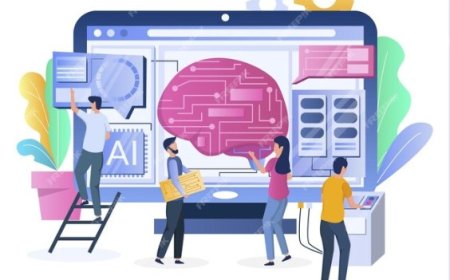The Benefits of Artificial Intelligence
The benefits of AI in daily life, from automating tasks to improving healthcare and customer service. Learn how AI helps businesses like Walmart thrive.

AI is Everywhere Around Us
Everywhere I look, I see how artificial intelligence (AI) is becoming part of our daily lives. It’s not just in science fiction movies or tech news; it’s in our phones, our favorite apps, and even in the products we buy. I see AI in voice assistants, like Siri or Alexa, and in online recommendations that seem to “know” what I want next.
This isn’t just cool technology. AI is here because it’s useful and powerful. But what makes it so special? Why is everyone talking about it? That’s what I’ve been thinking about lately.
Many People Are Confused About AI
Even though Artificial Intelligence is everywhere, many people still don’t understand it well. Some think it’s just robots taking over jobs or making decisions for us. This misunderstanding can make people worried about AI instead of seeing how it can help us. I think it’s important to understand what AI can do so we can use it in the best way possible.
What Are the Benefits of AI?
So, what does AI do for us? Why are people, companies, and even schools interested in it? Let me explain some of the key benefits I’ve seen.
The Main Benefits of AI
1. AI Automates Repetitive Work
AI is great at doing repetitive tasks, like answering the same questions over and over again. This frees up time for people to focus on more important work. For example, chatbots in customer service handle simple questions, and banks use AI to quickly process loan applications.
-
How It Helps: AI does the boring tasks so humans can work on creative or important things.
-
Real-Life Use: Banks use AI to look at loan applications faster, saving time and reducing errors.
2. AI Turns Big Data Into Useful Information
AI helps make sense of the huge amounts of data we create every day. For example, it helps companies understand what customers want, making products better. AI also finds patterns that we might miss.
-
How It Helps: AI helps make decisions based on facts, which helps people make better choices.
-
Real-Life Use: Netflix uses AI to recommend movies based on what you’ve watched before.
3. Creating Better Customer Experiences
AI makes using technology more fun and personalized. It helps recommend products you might like when you shop online or suggests songs you may enjoy on music apps.
-
How It Helps: AI makes your experience easier and more enjoyable by personalizing it.
-
Real-Life Use: AI chatbots can quickly answer your questions on websites, helping you get help faster.

4. Predicting Trends and Making Smart Predictions
AI looks at data to predict what might happen in the future. For example, stores use AI to predict which products will be popular, and AI in healthcare can find early signs of diseases.
-
How It Helps: AI helps people and businesses prepare for future events by making smart predictions.
-
Real-Life Use: AI helps machines in factories predict when they need repairs, so they don’t break down.
5. Improving Healthcare
AI helps doctors find diseases early by looking at medical images, like X-rays. It can also create better treatment plans for patients, making healthcare faster and more effective.
-
How It Helps: AI helps doctors make quick decisions, so patients can get better faster.
-
Real-Life Use: AI-powered robots assist in surgeries, making them more accurate and helping patients recover quickly.
6. Detecting Fraud and Keeping Information Safe
AI helps keep your money and personal information safe. For example, it can spot unusual charges on your credit card or detect hacking attempts on websites.
-
How It Helps: AI keeps your data safe by detecting suspicious activity and stopping fraud.
-
Real-Life Use: Banks use AI to watch millions of transactions for signs of fraud, protecting your money.
7. Personalization Everywhere
AI helps create personalized experiences for people. For example, AI helps learning apps adjust lessons to your pace, and music apps suggest songs based on your taste.
-
How It Helps: Personalization makes things easier and more enjoyable by fitting them to your needs.
-
Real-Life Use: Smart thermostats adjust your home’s temperature based on your preferences, making it more comfortable.
8. Saving Money and Using Resources Wisely
AI helps save time, money, and energy. For example, AI predicts when machines need fixing before they break down. It can also save energy by turning off lights when not needed.
-
How It Helps: AI helps reduce waste and makes things more efficient, saving money and resources.
-
Real-Life Use: Factories use AI to improve production, saving money by reducing waste.
9. Working Alongside Humans
AI doesn’t replace humans; it helps them do their jobs better. For example, teachers use AI to grade tests faster, giving them more time for one-on-one teaching.
-
How It Helps: AI works with people, making their jobs easier and allowing them to focus on more important tasks.
-
Real-Life Use: AI assistants help with tasks like scheduling appointments or setting reminders.
10. Helping Us Make Better Decisions
AI helps people make smarter choices by using data. For example, businesses use AI to decide what to sell based on trends. People also use AI apps to manage money or plan their day.
-
How It Helps: AI uses data to provide smart suggestions, helping people avoid mistakes.
-
Real-Life Use: Weather apps use AI to give accurate forecasts, helping people prepare for the weather.
Case Study: How Walmart Uses AI to Improve Its Business
Walmart, one of the biggest stores in the world, uses AI (Artificial Intelligence) to make its business run better. AI helps Walmart solve problems like keeping enough products on the shelves, improving customer service, and staying ahead of its competitors. Here’s how Walmart uses AI and how it benefits their business:
1. Managing Inventory with AI
Walmart has millions of products to manage. It's hard to make sure all the right products are on the shelves at the right time. AI helps Walmart by predicting what products customers will want and when they will need them. This makes sure they don't run out of stock, and they don’t have too many items either.
-
AI-Powered Forecasting: Walmart uses AI to look at past sales, weather, holidays, and local events to predict what items will be in demand. This helps Walmart make better decisions about how much of each product to keep in stock.
-
Real-Life Result: Using AI to forecast demand helped Walmart reduce excess inventory by 10-15%. This means they waste less money on products that don't sell.
2. AI Robots for Shelf Scanning
Walmart has also started using robots in some of its stores. These robots scan the shelves to make sure products are in the right place and that shelves aren’t empty. When the robot sees that a product is low or missing, it alerts employees to restock the item.
-
Real-Life Result: Walmart says these robots helped improve how many products were on the shelves, making sure that customers could always find what they needed.
3. AI Chatbots to Help Customers
AI is used by Walmart in customer service too. When you shop on Walmart’s website, you can use a chatbot (an AI tool) to help you find answers to questions, track your orders, and even recommend products.
-
Real-Life Result: Walmart’s AI chatbots reduced response times for customers by 25%, which means customers get help faster, and are more satisfied.
4. AI for Price Adjustments
Walmart also uses AI to make sure its prices are always competitive. AI looks at the prices of other stores, how many people want certain products, and even what time of year it is to help Walmart set the best prices.
-
Real-Life Result: During busy shopping times, like Black Friday, Walmart uses AI to offer the best prices that attract more customers while still making a profit.
5. Predicting When Machines Need Repairs
Walmart uses AI to make sure its trucks and equipment stay in good shape. AI tracks the health of the machines and tells Walmart when something might break or need repairs, so it can fix it before it stops working.
-
Real-Life Result: By using AI to predict when something will break, Walmart saved 10% on maintenance costs.
What’s the Impact for Walmart?
-
Cost Savings: Walmart saves money by reducing overstock and keeping its inventory at the right level.
-
Better Customer Service: AI helps Walmart answer customer questions faster with chatbots, leading to better service.
-
Smarter Decisions: AI helps Walmart make decisions based on facts instead of guesswork, helping the business run more smoothly.
Walmart’s use of AI is a great example of how businesses can use this AI technology to improve how they work. From helping with inventory and prices to improving customer service, AI helps Walmart save money and keep customers happy. This shows how AI can make a big difference in a company’s success and how it can help businesses run more efficiently.
AI is changing the way we live and work, making many things easier and faster. It helps businesses like Walmart by improving how they manage products, answer customer questions and set prices. AI also helps in healthcare, predicting problems early, and making smart choices. While some worry about AI taking jobs, it helps people do more important work. Overall, AI is a helpful tool that makes our lives and businesses run better, saving time, money, and resources. When used the right way, it can make a big positive difference.
Frequently Asked Questions (FAQs)
1. Why do some people not see the benefits of AI?
Some people do not see the benefits of AI because they believe that AI will lead to job loss and a decline in human abilities.
2. What are the most important benefits of AI?
The most important benefits of AI are speed, accuracy, efficiency, and scale.
3 How can AI help the world?
AI helps solve big problems by improving healthcare, reducing waste, and making systems more efficient, benefiting both businesses and society.
4. How does AI benefit everyday life?
AI personalizes experiences by recommending things like movies, music, and products, making life more convenient and enjoyable for us.





























































